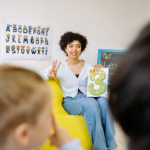
10 Oct Metaphorically Speaking
Jennifer Aberhart understands the benefits of offering various approaches to the teaching of English.
Many lovers of language delight in the literary art of metaphor and allegory. Indeed, whatever our cultural background, many of our fables, parables, and richly metaphoric stories and writings have been revered and handed down from generation to generation as a way of imparting truths about human existence. We also have great admiration for contemporary writers who can find new ways to impart old information using the beauty of language. For many of us, these writings are treasures. Therefore, it is perhaps only natural that we should desire to share this richness with our children.
Why Some Students Struggle with Metaphor and Allegory
However, some students struggle to master the art of translation from simple story to alluded meaning. Watching some Year 12 pupils struggle with understanding the symbolism in even relatively simple metaphorical pieces of prose makes me aware of the diversity of humanity. “Why don’t these poets and writers just say what they mean?” “They take so much time to say something they could have said in one sentence?” “It doesn’t really make sense.” “It’s really boring!” These are just a few of the comments from students weary from the struggle to grasp why people choose to write in such a seemingly obscure manner.
Literature and Autism: The Need for Literal Communication
We now understand that for children on the autistic spectrum, allegorical and metaphorical texts are usually completely inexplicable because they need their verbal and textual communications to be literal. Our daily language is often peppered with idioms such as ‘Don’t cut your nose off to spite your face’ and ‘Don’t cry over spilt milk’.
Idioms and Metaphors: A Barrier for Autistic Learners
The art of communication is extremely complicated for those who can’t understand the connection with a particular action that has nothing at all to do with the faces or milk spoken about. Thirteen-year-old Luke Jackson, in his book Freaks, Geeks & Asperger Syndrome, includes an appendix of common idioms he has had to master to help him respond appropriately to other people. He can, therefore, ‘translate’ what he hears into what he has learned it means. He will always need an explanation that he can remember and tag to a new expression and will probably not ever be able to figure out an underlying meaning for himself.
How Figurative Language Poses Challenges in the Classroom
When a phrase or sentence poses such a problem, imagine how difficult it is for him as he tries to understand the meanings lurking at all levels in our literature. Classroom experience would suggest that this need for words to convey only their precise meaning encompasses a great many more children than just those diagnosed with this particular disability. We also know that, generally, given the choice, a large percentage of boys prefer to read only factual texts.
The Role of Rote Learning in Understanding Literature
As we discover more about the different needs and diversity of children, perhaps we might be a little kinder to those who do not see either the beauty in prose or the deeper meaning it is supposed to convey to them. In order to pass examinations, these children have to spend many hours rote-learning what we tell them a certain text really means. Even after prolonged discussion and study, they often confess that they don’t really “get it.” Regardless of the amount of exposure we give them to our ‘best’ literature, they will never find the great pleasure or implicit understanding that others of us gain in reading it.
Balancing Literary Appreciation with Diverse Student Needs
Many children are quite happy to enjoy the rhythm and rhyme of a piece of poetry without any understanding of its underlying meaning, in much the same way as a young child enjoys chanting ‘Ring a Ring a Rosy’. The musicality of words can have an effect all of its own, akin to that of a piece of music. There is a beauty to be found in the sense of flow conveyed by some phrases and sentences.
How to Engage Students Who Prefer Factual Texts
We are aware that literature usually functions on both explicit and implicit levels. Many young children who have trouble with understanding the underlying meaning of an allegory can still enjoy an Aesop fable or a Hans Christian Andersen tale as a literal story. In the same way, some teenagers or adults are able to find some pleasure in George Orwell’s Animal Farm or 1984. It is only when they are asked to ‘see’ something that is not at all apparent to them that they lose whatever joy they may have experienced.
The Ongoing Debate: What Should English Education Prioritize?
Having to cater for such vastly different needs makes it difficult to know exactly which texts an educational system should subject its pupils to. On the one hand, we want to extend to children who enjoy literature the opportunity to experience and learn as much as possible. We want to expose them to the rich experiences of different prose that they may not encounter in their homes. We want to show children how to extract the fullest possible meaning from such works by understanding the context and times in which they were written, as well as their essence and an appreciation of their use of metaphor. By doing so, we hope to broaden children’s perspective of the world and their place in it.
Creating a Fair Educational System for All Learners
On the other hand, we do not want to drive children away from a life of reading by inflicting on them particular works that do not resonate with them at all. We do not want some children to have to spend many hours learning by rote the meanings that we explain to them are in a particular work.
The Impact of Literature on Students’ Long-term Engagement with Reading
This leads us to the question of how much emphasis we should put on the ability to dissect and discuss literature and how much on the clarity and grammatical correction of children’s written work when we are testing language skills and their potential for further education at university. We live in a technological society that needs scientists, computer wizards, and engineers – people who must deal efficiently with facts and possibilities but not necessarily with the world of literature. Although there may well be a percentage of these people who are glad of their education in this area and who appreciate time spent with a good book, there are others who have probably never picked up a book of fiction since leaving school and never intend to. There may also be many talented people who have missed out on gaining access to higher education simply because the study of literature was complete gobbledegook to them and their English marks affected their overall result.
Should All Students Study Literature? An Ethical Dilemma
The questions posed for educators as they attempt to select suitable English studies are immense. They range through the ongoing debate on which language skills are essential, to exactly what it is we should be measuring and how we can ever arrive at a system that gives fair opportunity to everyone. Those of us who had our first taste of literature at our schools will be forever in their debt for awakening us to its wonders and pleasures and enriching our lives with books that we might otherwise have never read or understood. However, those who suffered hours of agony, lost in a maze of incomprehensible words, will no doubt look back on the same time of their lives with loathing. They may feel that they wasted many precious hours that they could have been studying something they really liked or would be much more useful to them.
A society flourishes in its diversity, so perhaps we need to keep examining ways to meet the different needs of different people who will contribute in different ways to the communities in which they live. We might decide that for some of our children, an enforced study of particular literary works is an unnecessary hardship that, in the end, contributes nothing to either their personal well-being or that of society.





